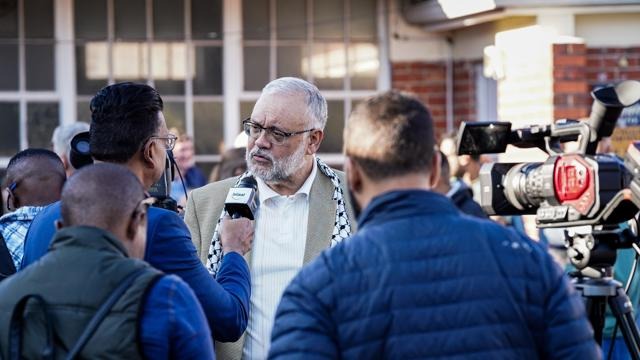
Rasool, a long-time MYM associate and Al-Qalam columnist hopes to reset the relationship between South Africa and the US – and also advance SA’s legal and moral case for Palestine, writes Nabeelah Shaikh.
Seasoned diplomat and politician Ebrahim Rasool will soon be returning to the United States as South Africa’s Ambassador to the U.S. and says he’s honoured about his reappointment. Rasool previously held this position between 2004 and 2010.
His appointment, announced by the Department of International Relations and Cooperation this week, comes at a time of shifting political dynamics, with a new Republican administration set to take office in January 2025 under the leadership of President Donald Trump.
Speaking to Al-Qalam, Rasool has highlighted the challenges and opportunities his return presents.
“It’s a great honour to be asked to return almost exactly 10 years after leaving this office. At 62 years old, this may well be my last official tour of duty as a South African diplomat. It is a pivotal moment, both for me personally and for our country’s relations with the United States,” said Rasool.
One of Rasool’s primary objectives in his second stint as ambassador will be to restore the political and economic relationship between South Africa and the United States, which he believes has suffered some disrepair in recent years.
“The relationship has seen imbalances, and there have been misunderstandings. My role will be to reset that relationship, ensuring that South Africa’s interests are advanced while maintaining a positive political and economic climate,” said Rasool.
Rasool says one of the first things he needs to do when he takes up the role again would be to familiarise himself with a completely new group of people. “My previous time was entirely under the Obama presidency. I became very comfortable with the incumbent Democrats. I’ve kept an open relationship with the Republicans. I met Donald Trump in 2012, and I’d like to familiarise myself with the new people in Washington. And show that the South African Embassy is fit for purpose and is up to the task of what is required of us from the President,” said Rasool.
One of the key issues Rasool will navigate in his new role is South Africa’s strong stance on the Palestinian cause. South Africa has long been an advocate for Palestinian rights, a position that has sometimes put the country at odds with US policy. However, Rasool sees the need for a nuanced approach, particularly given the US’s changing political landscape.
“South Africa must continue its legal and moral case for Palestine. We cannot shy away from our values, but we must also consider the broader context—our relationships with American companies, the livelihoods of workers, and our economic interests,” said Rasool.
He pointed to the fact that 250,000 South Africans benefit from employment by American companies, and balancing this economic partnership with South Africa’s principled stance on Palestine will require diplomacy and pragmatism.
In his view, South Africa’s role is no longer about being the loudest voice in the room but about championing human rights and justice within international legal frameworks.
“We must recalibrate our approach. The world will forgive us if we focus on advancing the legal and moral case for Palestine without unnecessarily escalating tensions,” he added. Rasool says he’s well aware of the challenges posed by the incoming Republican administration. Drawing on his previous diplomatic experience under the Obama administration, he plans to adapt his approach to a more transactional diplomatic style, in line with the pragmatism often associated with President Donald Trump’s approach.
“President Trump, from what I know about him, is transactional rather than ideological. As South Africans, we must speak the language of transactional diplomacy. The Trump administration values deals that benefit both parties. The United States has the capital to drive Africa’s green industrial revolution, and we have the critical minerals they need for their own economic growth,” said Rasool.
Rasool’s early involvement in activism, particularly within the Muslim Students’ Association (MSA) and later in the Call of Islam movement, has had a lasting impact on his diplomatic approach. He was part of the United Democratic Front during South Africa’s anti-apartheid struggle, working alongside people of various faiths and ideologies, including communists, evangelical Christians, and Jewish activists.
This experience, Rasool believes, has equipped him with the ability to bridge divides and work across differences—a skill he now brings to his role as ambassador.
“I never feel threatened about my own identity as a South African Muslim. In the interfaith movement, I sat alongside people from all walks of life, and I learned the value of understanding and engaging with those who are different from me,” said Rasool.
This ability to navigate difference, he believes, will be crucial as he works with both Democrats and Republicans in the U.S.
“It’s only insecure people who fear those who are different. I have confidence in my own identity, and I take that with me into any engagement,” said Rasool.












